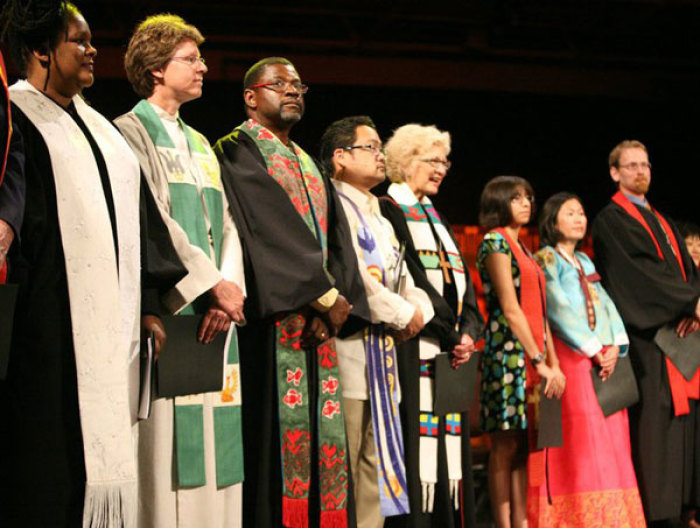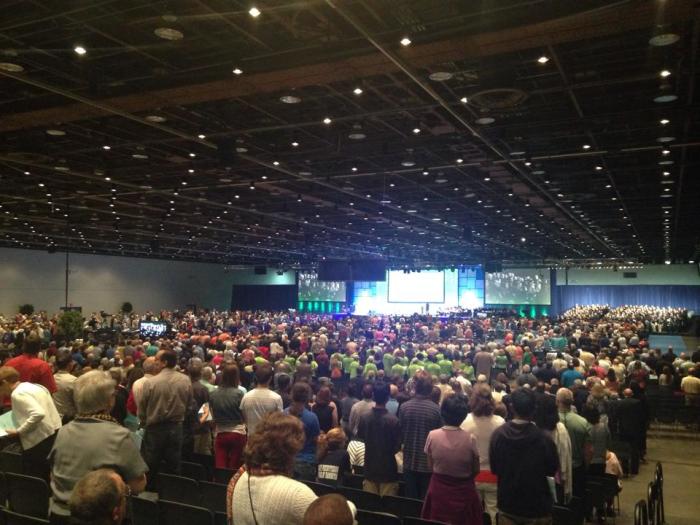Presbyterian Church (USA): 7 Votes Away From Redefining Marriage to Include Gay Couples

The largest Presbyterian denomination in the United States is only seven votes away from having enough regional bodies favor changing its official definition of marriage to include homosexual unions.
At last year's general assembly, Presbyterian Church (USA) approved an amendment changing their Book of Order's definition of marriage from being between "a man and a woman" to "two people, traditionally a man and a woman."
Known as Amendment 14-F, the possible change to the Book of Order is leading with 79 regional bodies, or presbyteries, in favor and 37 opposed.
These 79 regional bodies included the Presbytery of East Tennessee, which narrowly approved the amendment Saturday in a vote of 61-56.
In a meeting held in Chattanooga, delegates spoke for and against Amendment 14-F. According to local media, one proponent was University of Tennessee campus minister Kally Elliott.
"We have a lot of students who come into our campus ministry with their story being one of hurt and shame given to them by the church," said Elliott.

"Our goal is to share with them the love of Jesus Christ and to let them know that they are fully loved, fully welcomed as they are, who they are."
Last June the PCUSA General Assembly held in Detroit, Michigan, voted in favor of a recommendation to amend the denomination's Book of Order regarding the definition of marriage.
"A proposed amendment to change the constitution to include same-gender marriages in the church's constitution passed the General Assembly but must be ratified by a majority of the church's 172 regional presbyteries," explained PCUSA in a FAQ document.
"Presbyteries have one year to vote on the proposed amendment. If a majority ratifies the amendment, it would take effect June 21, 2015."
During the Valentine's Day weekend several presbyteries voted on Amendment 14-F, including the Presbytery of North Alabama.
"With a vote of 28 to 24, representatives … approved an amendment to the Presbyterian Book of Order, a part of the church's constitution, to allow, but not require, Presbyterian ministers to perform same-sex marriages in states where that is legal," reported Kay Campbell of al.com.
"As several ministers present at the meeting of ministers and lay leaders pointed out, ministers have always had the option to refuse to perform marriages for couples who, in their opinion, were not fit for marriage."
In an earlier interview with The Christian Post, Carmen Fowler LaBerge, president of the Presbyterian Lay Committee, a theologically conservative group, called the likely passage of Amendment 14-F "tragic, but not surprising."
"The Presbyterian Church (USA) has been actively undermining her own theological foundations for generations. This vote is simply the result of a hundred years of progressive deviation from the Truth," said LaBerge.
This is not the first time that PCUSA has garnered headlines on its internal debate over homosexuality and the Church.
In 2010, the PCUSA General Assembly approved Amendment 10a, a measure that allowed for presbyteries to ordain noncelibate homosexuals.
In response to the passage of the amendment, over 150 congregations voted to disaffiliate from the mainline denomination.
"As more and more Presbyterians in the pews wake up to the reality that their denomination has abandoned the Bible in exchange for the accommodation of sexual immorality, many of them will leave," LaBerge told CP.
"They will either leave individually or they will seek to leave corporately as a congregation. But we are seeing presbyteries constrict the ability of congregations to leave, so many will wake up too late to escape."




























